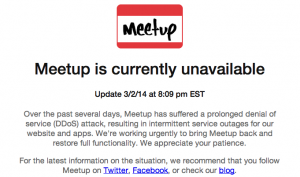In case you didn’t watch the Academy Awards Sunday, here’s the photo that ‘broke’ Twitter. DeGeneres’ tweet knocked Twitter offline for a bit, racking up more than 700,000 retweets and nearly 200,000 favorites in just 30 minutes. Here’s why you should care, 2 useful resources, and 2 precautions you should take now to protect your business.
It was not Ellen DeGeneres’ intent to shut down Twitter, but it’s a perfect example of how a DDoS attack works.
For those unfamiliar with the term, a DDoS attack is when an attacker floods a site, with no prior warning, with so much malicious traffic that it is unable to respond to legitimate traffic.
Why You Should Care Reason #1: A DDoS attack on one of your vendors may prevent you from conducting business
Did you notice that some of your favorite web apps were down last week? I certainly did, since one of the sites that was down was AWeber, which I use to manage my list, send out my ezine, and collect new subscribers using forms on my website. Meetup.com was also down, as were several other web apps – I’ve included a screenshot of what I saw when I tried to use the Meetup site. [tip: Meetup is a good resource to find networking events].
This outage may have cost me business – anyone who tried to sign-up for my ezine or one of the complimentary downloads I offer on my website would have been unable to do so when AWeber was down. It would have looked like a broken link. And the likelihood of that person thinking “Hmm, it might be a DDoS attack on AWeber causing this, so I’ll try again later” is pretty slim. 
The Meetup DDoS attack is fascinating for causing so much mayhem for what was evidently just a lark; the hackers who brought down the site for several days were demanding just $300 to stop. It would not pay, Meetup CEO Scott Heiferman told Reuters.
Why You Should Care Reason #2: A DDoS Attack on your website will be expensive
Don’t scoff – the Meetup hackers I mentioned in the last paragraph seemed to conduct their DDoS attack just for the heck of it, and DDoS attacks are increasing – DDoS attacks are now responsible for 18 percent of outages at U.S.-based data centers, up from just 2 percent in 2010, and the average cost of a single outage was $630,000, according to the cyber-security-focused Ponemon Institute. Sure, you’re probably not going to spend $630,000, but how much would it cost you — and is it money you can afford?
Precautions You Can Take
- Talk to your web host (or delegate your webmaster to do this) and find out what precautions they have in place to fend off a DDoS attack. Do they have recommendations of added protections you could implement? At a bare minimum, make sure you are current with updates on your site – these often include security plugs.
- Consider the web apps you use that are critical to your business. Do you have a backup plan in case those apps are down for an extended period of time? Do you know who to call for assistance? For instance, if Gmail is down, I can use the webmail feature of my domain to send and receive email – do you know how to do that? Do you need to set up a Gmail account to use in case your webmail is down? Do you have a copy of your website, stored somewhere other than on your web host? These are the types of things that need to be documented so not just you, but any employee or independent contractor can quickly check to implement your backup plan. [tip: you can delegate the research to another member of your team – but don’t forget to review and okay the backup plans they create – part of your job as CEO is to make sure your team has not missed something in the ‘bigger picture’ of how your business runs.]
- Is It Down Right Now is a resource I use to quickly check when I am unsure if it’s me or a larger problem. It monitors the status of your favorite web sites and checks whether they are down or not.
- Many companies will use Twitter to post updates when there is a problem, so check there. You can also use the search feature in Twitter to see if others are reporting a problem.
I enjoyed the Oscars Sunday night – and thank Ellen DeGeneres for her unintentional reminder to have a backup plan in your biz.
If you found some value in this article, it would mean a ton to me for you to share this with your LinkedIn and/or Facebook contacts. Comments are also appreciated!


